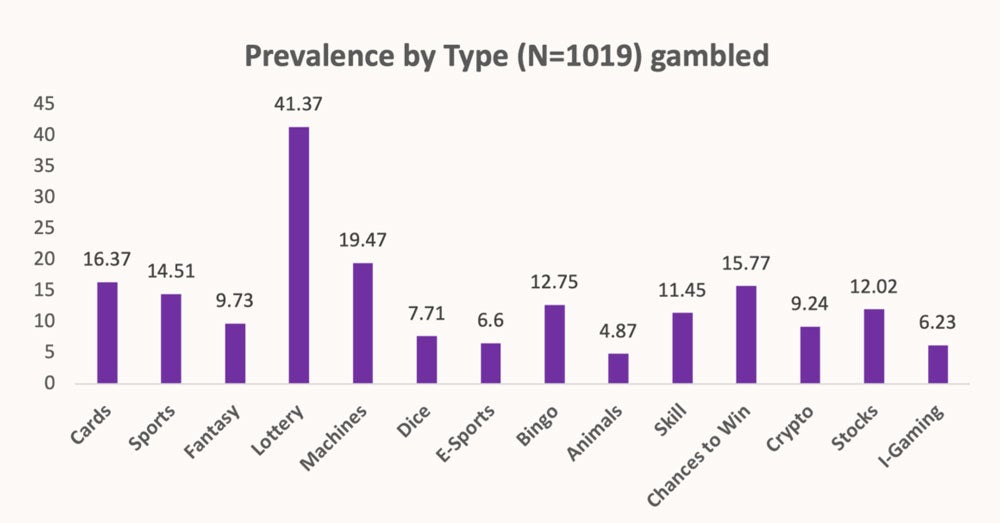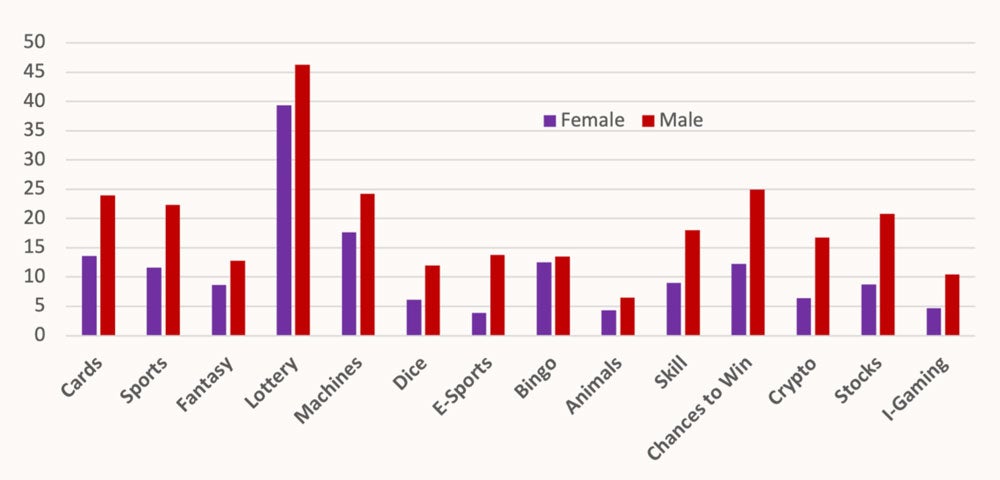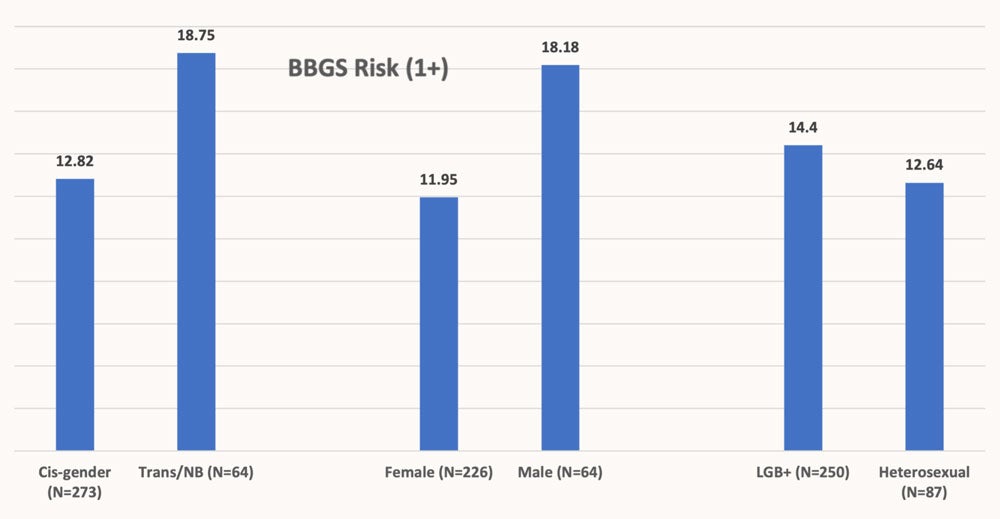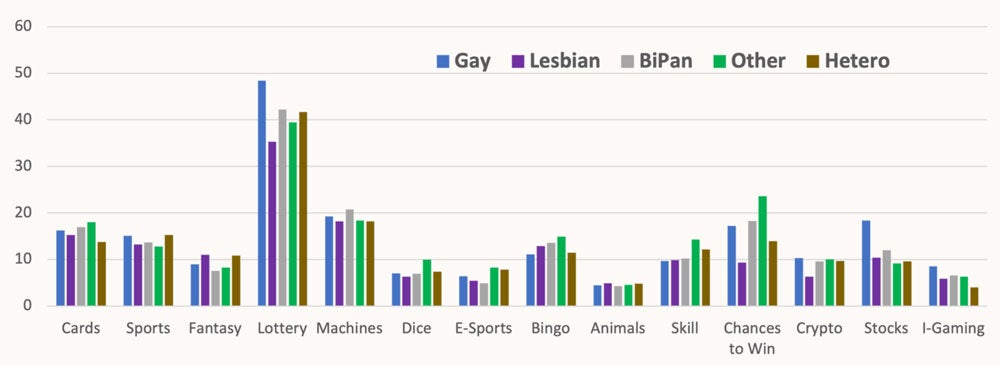NC Study Comparing Gambling Behavior & Risk Based on SOGI Data
Purpose of Study
Most gambling prevalence studies do not ask about sexual orientation and/or gender identity, leaving a hole in understanding whether people who identify as LGBTQ+ have similar, lower, or higher risk for gambling-related harms. Given the vast amount of research indicating higher risk for substance use among LGBTQIA+ identities, this study attempts to understand whether there is a larger need for resources to this community through a comparative sample based on SOGI data in North Carolina.
Terms
- SO: Sexual orientation
- Het: Heterosexual
- LGB+: sexual minority
- GI: Gender identity
- GAAB: Gender Assigned at birth
- AMAB: Assigned male at birth
- AFAB: Assigned female at birth
- Cisgender/Cis: Identify with the gender assigned at birth
- Trans/NB: Identify with a different gender than assigned at birthSenior
Methodology
All data was collected in 2024 (after sports wagering became legally available in NC) at NC pride festivals (Asheville, Charlotte, Greenville, & Wake Forest). Participants were asked to take a survey which included questions related to gambling behavior & risk, pathways to gambling & comorbidities, as well as demographics in exchange for a gift card. Anyone 18+ was permitted to participate regardless of identity. Gambling frequency, as well as risk based on the Brief Biosocial Gambling Screen (BBGS), were only answered by participants who self-reported gambling in the past year. Analysis primarily utilizes Chi-Square tests due to categorical data. Analysis includes gambling behavior and risk based on (1) the whole sample, (2) gender identity, (3) sexual orientation (binary & categorical), and (4) SOGI analysis within AGAB.
Prevalence, Gambling Type & Risk
- Most common types of gambling were lottery, machines/slots, cards, &chances to win in video games/loot boxes
- Individuals gambled on all assessed types, including i-gaming [currently not legal] likely from unregulated offshore casino sites
- 18-20 year old participants gambled on all types including those they are underage to engage in legally
- BBGS (risk) is not statistically significant when comparing SO (binary or categorical), GAAB, nor GI (binary or GAAB), although Trans/NB have a higher risk than Cis and LGB+ has a higher risk than Het
- Regardless of SOGI, those AMAB gambled on every type more than those AFAB (AMAB=76.79%; AFAB =60.24%)



Gambling Type & Frequency Prevalence Based on SOGI
Gender Identity (GI)
- While cis individuals were more likely to gamble monthly or more (cis=33.7%; trans=22.77%), overall gambling in the past year was similar (cis=65.48%; trans=62.38%)
- Without considering GAAB, cis individuals were more likely to wager on every type of gambling, except trans individuals were ~2x as likely to wager on chances to win in video games (cis=13.17%; trans=26.57%)
- Cis individuals were significantly more likely to gamble on sports, fantasy sports, lottery, & crypto
- When considering only those AMAB, GI is no longer significant for prevalence of each type of gambling, as well as overall with 76-77% of all participants AMAB gambling in the past year (cis n=238; trans n=42)
- There is a significant difference in gambling behavior for those AFAB, where cis were significantly more likely to gamble on sports, fantasy sports, and overall, & trans/nb were more likely to gamble on chances to win in video games (cis n=578; trans/nb n=159)
Discussion & Conclusion
- SOGI is not as important as GAAB where those AMAB gamble more frequently & cis men gamble more than trans/nb AMAB
- Within SO, individuals who are gay gamble more often and lesbians gamble the least (these results differ from prior studies and needs to be further explored)
- BBGS analysis did not indicate increased risk based on SOGI, however about 3.5% of the sample self-identify as having a gambling problem, nearly 14% of those that indicated they gambled suffer from at least one gambling-related harm with those AMAB at ~18% and AFAB at ~12% (indicating a high prevalence rate for needing further assessment for Gambling Disorder
Sexual Orientation (SO)
- LGB+ identity is not significant for prevalence of types of gambling (when not comparing SO categories nor GAAB)
- For AMAB, SO becomes significant for fantasy sports, e-sports, & skill games, with het men having higher prevalence & frequency on all three types (LGB+ n=213; Het n=83)
- There is no statistical difference in gambling behavior based on SO for AFAB
- LGB+ categorized identity is significant for two emerging types of gambling (chances to win in video games & cryptocurrency)
- Regardless of GAAB, participants identifying as gay generally showed the highest prevalence, while those identifying as lesbian showed the lowest prevalence

Funded in part by
NC Department of Health and Human Services
Senior Research Team
- Dr. Michelle L. Malkin (PI) – GRPI Director
- Dr. Michele Stacey (Co-PI) – GRPI Affiliated Faculty
NC Pride Fest GRPI Booth Volunteers
Hope Bishop, Latasha Cobb, Morgan Greene, Josh Hampton, Joy Malkin, Cate Meardon, Chris Meardon, Cassidy Morrison, Tiffany Reddick, Jacqueline R. Watson, & Kexuan Zhou
